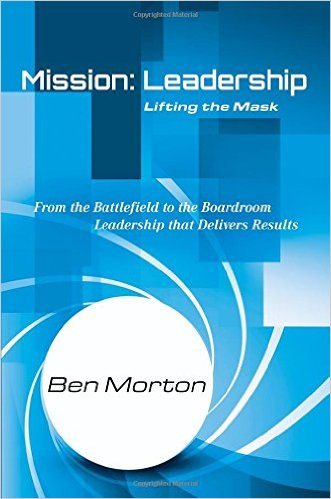Mission: Leadership – Lifting the Mask is an easy to read book which explores what makes leaders, victims, villains and heroes.
Written by Ben Morton, who completed two tours of duty in Iraq as a captain of the British Army and has had leadership roles in the corporate world, the book contains anecdotes from both his military and business experience which powerfully demonstrate the role of the leader. Part leadership guide, part autobiography and part fiction ‘Mission Leadership’ is quirky in its layout and approach (think Marvel comic, at points!)
Morton, who is almost evangelical in his approach at times, asserts that leadership is not something that you do – it something you are: “Leadership is not a set of behaviours to be imitated or a process to be followed. It is a way of being that empowers, inspires and transforms those around you.”
Through a wide range of stories, Morton demonstrated how excellent leadership liberates teams and individuals— allowing individuals to create great results, enjoy their work and appreciate the company they work for whilst villainous leadership leaves behind a trail of disaster, broken individuals and teams, low morale and poor results.
As Kevin Cashman does in Leading from the Inside Out, Morton extols the power of authentic leadership. He encourages leaders to think about their values and to what extent these are aligned with the organisation they work for (or not!) Leading with Authenticity is one of our key leadership principles at Standard Life. We believe that when individuals are being genuine and show more of who they are, they build trust and safety which is fundamental to high performing teams. Being authentic and guided by values is a central theme of ‘Mission Leadership’. Morton provides real examples of organisations where his values have been congruent with his employer, allowing him to flourish (World Challenge) and where they have been at odds (Tesco) which led to him feeling disempowered and disengaged.
He also stresses the importance of trust and respect in leadership especially when asking your team to take huge risk for you. One of the stories he tells from his time in Iraq (which explains the title) is of two soldiers who lifted their gas mask to carry out a sniff test to detect if there were chemicals in the air, a potentially life threatening move which requires deep trust in the leader. As the leader Morton had to keep his mask on but was responsible for monitoring his team members and to act swiftly should there be any sign of contamination in their bodies. This was a real test of all of his training and he writes: “In that moment I was the best leader I could be. And in every situation I strive to be that leader.”
Other success factors which Morton learnt during his time in the army are the importance of really getting to know your team, being able to call on them when you don’t have all the answers yourself, and the fact that you are always a leader and there is no getting away from that fact, even when the going gets tough.
During the second main section of the book, Morton talks about his decision to move out of the army and into corporate life. Through a series of short chapters, inspired by James Bond movies (Golden Lie, Diamonds are Team Members & The Answers are not enough for example) he illustrates the villains, victims and heroes he has personally encountered during his career. It’s interesting to read about Morton’s personal experiences of counterproductive leadership behaviours and the impact on him e.g. how leaders can micromanage, exert control, create fear and so on. However the James Bond/ fictional aspects of this part of this book feel over egged and at times confusing. Ben also repeats a lot of the points made in previous chapters and indeed previous pages so the key learns were diluted.
In section three, Morton outlines 10 leadership principles – none of which you can argue with. These include:
Serve to Lead – a theme which runs throughout the book and a principle which is clearly core to Morton’s beliefs
Leadership is about others but starts with us – which includes a good reminder that in order to serve, you need to take care of yourself as an individual and ensure you have a good work/life balance
Strive for Mastery – in essence about the importance of learning and staying open and curious around your growth as a leader.
Overall, the layout of the book is easy to follow and at the end of each chapter the reader is encouraged to stop and reflect on the key points and assess their own leadership, which is helpful.
Whilst the book has some interesting and compelling stories in it and is a very honest account of Morton’s personal leadership journey, it would have benefited from some judicious editing – a lot of the material feels repetitive by the end. As a consequence the gems of Morton’s experiences and reflections are sometimes lost.
Although ‘Mission Leadership’ is a great introduction to leadership and the underpinning principles which Morton demonstrates well, this book does not really take leadership thinking forward or introduce anything new to the debate about how leadership needs to continue to evolve. Challenges leaders are facing as a result of globalisation, increased complexity, dealing with ambiguity, working with multi-generational teams or complex problem solving in a networked organisations are not really covered.
In conclusion as an accessible introduction, or reminder, about the fundamentals of being a good leader, ‘Mission Leadership’ is worth a read and provides helpful checklists and questions. It provides prompts to the reader to think about how they lead every day in a way that has a positive impact on themselves, their teams and their organisations.
Gaynor Sharp, Global Head of Leadership & Adele Swan, Senior People Consultant Standard Life
Published by MPowr Publishing







